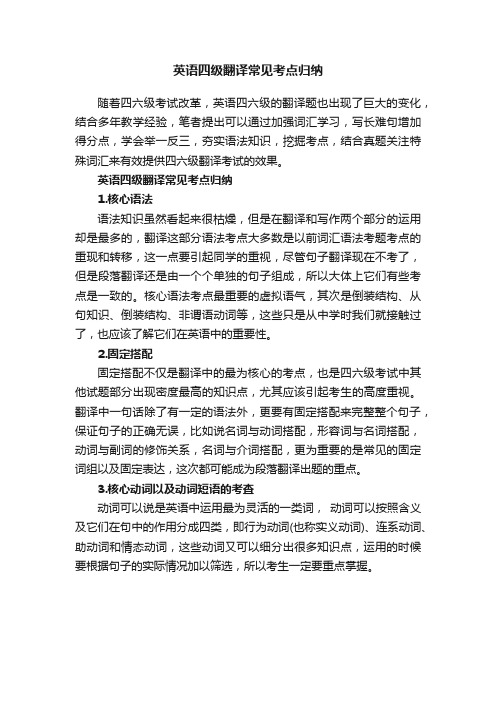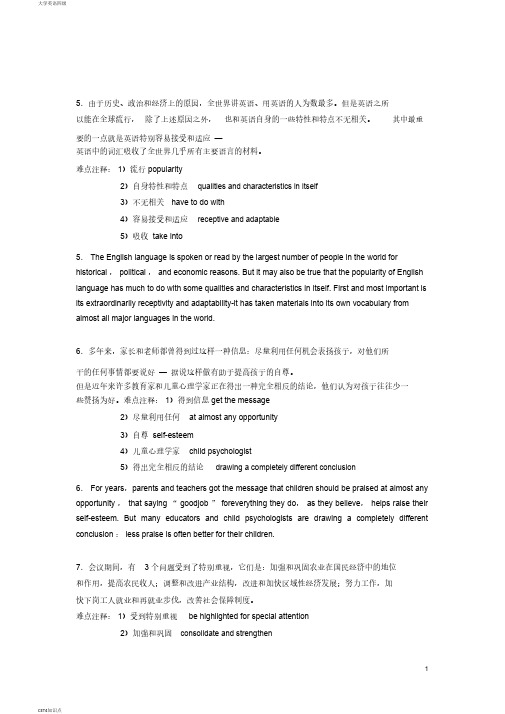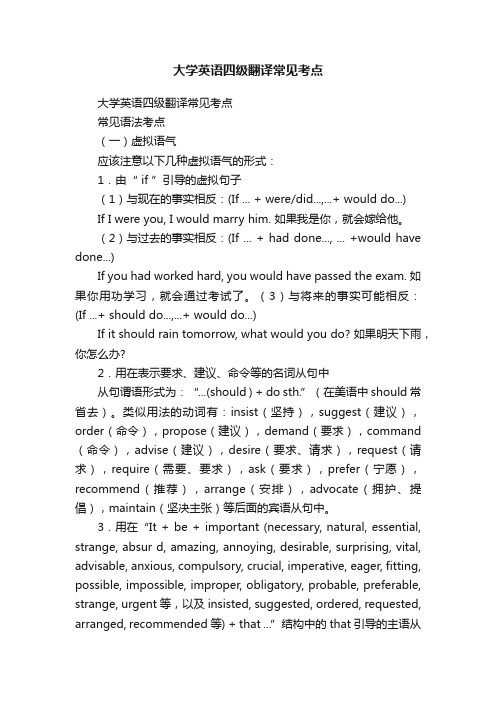英语四级翻译主要考点
英语四级翻译常见考点归纳

英语四级翻译常见考点归纳
随着四六级考试改革,英语四六级的翻译题也出现了巨大的变化,结合多年教学经验,笔者提出可以通过加强词汇学习,写长难句增加得分点,学会举一反三,夯实语法知识,挖掘考点,结合真题关注特殊词汇来有效提供四六级翻译考试的效果。
英语四级翻译常见考点归纳
1.核心语法
语法知识虽然看起来很枯燥,但是在翻译和写作两个部分的运用却是最多的,翻译这部分语法考点大多数是以前词汇语法考题考点的重现和转移,这一点要引起同学的重视,尽管句子翻译现在不考了,但是段落翻译还是由一个个单独的句子组成,所以大体上它们有些考点是一致的。
核心语法考点最重要的虚拟语气,其次是倒装结构、从句知识、倒装结构、非谓语动词等,这些只是从中学时我们就接触过了,也应该了解它们在英语中的重要性。
2.固定搭配
固定搭配不仅是翻译中的最为核心的考点,也是四六级考试中其他试题部分出现密度最高的知识点,尤其应该引起考生的高度重视。
翻译中一句话除了有一定的语法外,更要有固定搭配来完整整个句子,保证句子的正确无误,比如说名词与动词搭配,形容词与名词搭配,动词与副词的修饰关系,名词与介词搭配,更为重要的是常见的固定词组以及固定表达,这次都可能成为段落翻译出题的重点。
3.核心动词以及动词短语的考查
动词可以说是英语中运用最为灵活的一类词,动词可以按照含义及它们在句中的作用分成四类,即行为动词(也称实义动词)、连系动词、助动词和情态动词,这些动词又可以细分出很多知识点,运用的时候要根据句子的实际情况加以筛选,所以考生一定要重点掌握。
四级翻译常见考点总结

四级翻译常见考点总结(1)句型以及其倒装使用__________________________(直到他完成使命)did he realize that he was seriously ill.(Key:Not until he accomplished / finished the mission )建议:以此类推,掌握如下常用句型(以倒装方式给出)Not only ……..but also……So ( Such )…that……..Not until……….Neither…..nor……..Hardly …..when……..No sooner ……than…….Only by /through /in …., …………..例:Not only __________ (他向我收费过高)but he didn’t do a good repair. (key:did he charge me too much)(2)从句a. 定语从句Medical researchers are painfully aware that there are many problems _______________ (他们至今还没有答案) (Key :which/that they haven’t found answers to(2)非谓语动词a. 分词做伴随状语______________(与我成长的地方相比) this town is more prosperous and exciting.(key : Compared with the place where I grew up)注意,答案中除过去分词(compared with …)做伴随外,还含有where引导的定语从句b. 动词不定式做目的状语_____________(为了挣钱供我上学),Mother often takes on more work than is goodfor her. (Key : to support my university studies四级考试常考句型最……之一(1)他是他们班最高的孩子之一。
大学英语四级大学翻译知识点汇总

5.由于历史、政治和经济上的原因,全世界讲英语、用英语的人为数最多。
但是英语之所以能在全球流行,除了上述原因之外,也和英语自身的一些特性和特点不无相关。
其中最重要的一点就是英语特别容易接受和适应 —英语中的词汇吸收了全世界几乎所有主要语言的材料。
难点注释: 1)流行 popularity2)自身特性和特点qualities and characteristics in itself3)不无相关have to do with4)容易接受和适应receptive and adaptable5)吸收 take into5. The English language is spoken or read by the largest number of people in the world for historical , political , and economic reasons. But it may also be true that the popularity of English language has much to do with some qualities and characteristics in itself. First and most important is its extraordinarily receptivity and adaptability-it has taken materials into its own vocabulary from almost all major languages in the world.6.多年来,家长和老师都曾得到过这样一种信息:尽量利用任何机会表扬孩子,对他们所干的任何事情都要说好 — 据说这样做有助于提高孩子的自尊。
但是近年来许多教育家和儿童心理学家正在得出一种完全相反的结论,他们认为对孩子往往少一些赞扬为好。
大学英语四级翻译常见考点

大学英语四级翻译常见考点大学英语四级翻译常见考点常见语法考点(一)虚拟语气应该注意以下几种虚拟语气的形式:1.由“ if ”引导的虚拟句子(1)与现在的事实相反:(If ... + were/did...,...+ would do...)If I were you, I would marry him. 如果我是你,就会嫁给他。
(2)与过去的事实相反:(If ... + had done..., ... +would have done...)If you had worked hard, you would have passed the exam. 如果你用功学习,就会通过考试了。
(3)与将来的事实可能相反:(If ...+ should do...,...+ would do...)If it should rain tomorrow, what would you do? 如果明天下雨,你怎么办?2.用在表示要求、建议、命令等的名词从句中从句谓语形式为:“...(should ) + do sth.”(在美语中should常省去)。
类似用法的动词有:insist(坚持),suggest(建议),order(命令),propose(建议),demand(要求),command (命令),advise(建议),desire(要求、请求),request(请求),require(需要、要求),ask(要求),prefer(宁愿),recommend(推荐),arrange(安排),advocate(拥护、提倡),maintain(坚决主张)等后面的宾语从句中。
3.用在“It + be + important (necessary, natural, essential, strange, absur d, amazing, annoying, desirable, surprising, vital, advisable, anxious, compulsory, crucial, imperative, eager, fitting, possible, impossible, improper, obligatory, probable, preferable, strange, urgent等,以及insisted, suggested, ordered, requested, arranged, recommended等) + that ...”结构中的that 引导的主语从句中。
四级英语翻译语法要点

四级英语翻译语法要点四级英语翻译语法要点英语四级翻译应该是题型里面最好拿分的,在翻译这里拿下优秀,就离我们过关不远了哦!翻译一定要以理解为首要原则,以下是店铺为大家搜索整理的四级英语翻译语法要点,希望能给大家带来帮助!四级英语翻译三大语法要点 1一、英语四级翻译必考语法:介词使用(of/to/in…)过中秋节的习俗于唐代早期在中国各地开始流行。
过中秋节的习俗于唐代早期在中国各地开始流行。
习俗过中秋节的开始流行于唐代早期在中国各地。
The tradition of celebrating mid-autumn day became popular at the beginning of Tang dynasty throughout china.这个句子有印象没?是我借的六级句子给大家讲的吧?好,我们来看这次的新句子:中国给数百万在线零售商以极具竞争力的价格销售商品的机会。
中国给数百万在线零售商以极具竞争力的价格销售商品的机会。
中国给数百万在线零售商机会销售商品以极具竞争力的价格China is providing millions of online retailers chances to sell goods at a very competitive price.我们看到,完全不一样的两句话,完全一样的考点。
二、英语四级翻译必考语法:定语从句中国人自古以来就在中秋时节庆祝丰收。
这与北美地区庆祝感恩节的习俗十分相似。
Since ancient times, the Chinese people usually celebrate harvest in the Mid-Autumn, which is similar to the custom of celebrating Thanksgiving in the North America.我说过,『这』和『该』就是which吧,特别重要。
来,上新句子:据报道,今年中国快递服务(courier service)将递送大约120亿件包裹。
大学英语四级历年翻译知识点汇总

英语四级翻译1. Thisis yet _________________(两国人民的又一个共同点).2. Hisscientific works _______________在(英语国家得到广泛阅读 ).3. Revolution means the emancipation of the productive forces,_____________(改革也是解放生产力 ).4.Heis optimistic ________________对(现时信息产业的发展状况).5.Work in all fields should be subordinated to and ________________服(务于经济发展的进程 ).1. another common point between the people of our two countries解析:本题考查通过增补介词使译文的意思更完整。
虽然原文没有和between 相对应的词,但是 " 共同点"是两国人民之间在某方面进行比较的结果,所以增补between 之后,符合英语表达习惯。
增词法也是汉译英中常用技巧之一,再如:她以教书为业。
(Sheis a teacher byoccupation.)我已重新考虑了那件事。
(I've had second thought on that matter.)2. were widely read in English-speakingcountries解析:若是按照字面翻译,这句话很可能被译为were widely read in Englishcountries。
但是原文中 "英语国家 "的含义是 "讲英语的国家 " 。
这体现了英汉表达差异。
请考生看下面这句话的英译:我卖掉了彩电。
/I sold out my color TV. 这句译文错误在于,没弄清 "彩电 "的含义。
大英四级翻译部分语法考点汇总
状语从句主要考点1.时间状语从句:When, while, as after before since till (until)not……untildirectly immediately instantly the moment the instant the minuteas soon as no sooner… than hardly… whenDirectly I heard the news(我刚一听到消息), I ran to the spot.Since she married me, we have been happy.(我们一直很幸福)Be careful when /while you are crossing the street.(过马路时)We did not know global warming (我们才知道全球变暖) until we watched Discovery.06年12月考题:Some psychologists claim that people might feel lonely when they are away from home.(出门在外时可能会感到孤独)2. 地点状语从句:where whereverHe lives where the climate is mild.(气候宜人的地方)3. 原因状语从句:because since as now (that) seeing (that) in that considering (that)He was late because he missed the bus.(因为没赶上车)Since /As you won’t help me,(既然你帮不上忙)I’ll ask someone else.Considering (that) he was new at the job,(他是新手)he did it quite well.4. 结果状语从句:so that so…that such…that soHe worked so hard that he sometimes forgets his meal.(忘了吃饭)He got up early this morning so that he caught the first bus.(结果赶上了第一班车)5. 目的状语从句:in order that so that for fear (that) in case lest (以免)I am saving money in order that /so that I can buy a house.(为了买房子)He doesn’t dare to leave the house in case he should be recognized(以免被人认出)6. 条件状语从句:if unless as/so long as provided that on condition thatsuppose that supposing that in case(万一)Suppose/Supposing (that) all the doors are locked(万一门都锁了), how will you get into the house?In case I forget, please remind me about it.(请提醒我)07年6月考题:Please come here at ten tomorrow morning if it is convenient to you.(如果你方便的话)7. 让步状语从句although though even if even though whilewhatever whoever wherever whenever however no matter who/what/where/when/howAlthough/Though he was Spanish, he spent most of his life in Germany.(他大部分时间都在德国)Whatever/No matter what happens(无论发生什么事), you must be clam and quiet. Whichever/No matter which plan you adopt, you will encounter difficulties.(都会遇到困难)No matter how loudly you shout(不管你喊的多大声), you won’t b e heard.07年12月考题:I am going to pursue this course , no matter what sacrifice I am going to make.(无论我要做出什么样的牺牲)08年6月考题:Leaving one’s job, no matter what job is(不管是什么工作), is a difficult change, even for those who look forward to retiring.8. 方式状语从句: 见虚拟语气as if as though9. 比较状语从句: as…as than the more…the more…The more you use your brain, the more intelligent you will become.(越聪明)06年6月考题:The more you explain, the more confused I am. (我愈糊涂)限定性定语从句连接词:who, whom, which, that, when, where, why,非限定性定语从句连接词:who, whom, which, when, where, as▲限制性定语从句:1. Where:先行词除了是表示地点的名词以外,还可以表达事物的某个方面,阶段,情况,如field, stage, situation, scene,在从句中做状语If a shop has chairs where woman can park their men, women will spend more time in the shop. Today, we’ll discuss a number of cases where beginners of English fail to use the language properly (英语的初学者不会正确地使用这门语言)07年6月考题:The prevention and treatment of AIDS is the field where we can cooperate.(我们可以合作的领域)2. Why:先行词指原因This is the reason why I failed the exam.▲非限制性定语从句1.who, whomI sit between Mrs. Bradly and a shy girl, who seemed even younger than the other.(这个女孩看上去比其他人都年轻)I have four children, two of whom have decent jobs (其中两个人工作都很体面)2. Which:先行词可以是物,在从句中做主语或者宾语I have many books, some of which are English books(其中有一些是英语书).引导非限制性定语从句时,先行词可以指代前面的整个句子He came here, which made me happy(这使我很高兴).3. as “正如,好像”引导定语从句时,先行词指代前面出现的一句话,它在从句中做主语,宾语,表语,但通常置于句首As is reported in the newspaper(正如新闻中报告的一样), talks between the two countries are making progress.▲名词性从句主要连接词:that, whether, if , 特殊疑问词,what, whatever, whoever, whichever主语从句:That we are invited to a concert is good news to us. → It is good news to us that we are invited to a concert宾语从句:I don’t know whether we are i nvited to a concert.表语从句:The question is why we are invited to a concert.同位语从句:There is good news that we are invited to a concert.07年12月考题:Many Americans live on their credit, and their quality of life is measured by how much they can borrow(是用他们能够借到多少钱来衡量的),not how much they can earn .▲重点辨析名词性从句和状语从句的区别:What= whatever= anything thatwhoever= anyone whowhichever= anything that 引导名词性从句What = whatever = no matter whatWhoever = no matter who 引导状语从句Whichever = no matter whichWhat they need(他们所需要的) is a good nextbook.She will give whoever needs help(任何需要帮助的人)a warm supports.You can write about whichever topic you prefer(无论你喜欢哪个题目).No matter who comes(无论谁来), he will be welcome.07年12月考题:I’m going to pursue this course, no matter what sacrifice I am going to make(无论我做出什么样的牺牲)非谓语动词主要考点一般来说,一个句子只有一个最主要的动词作谓语,而其他动词称为不能做谓语的动词,即非谓语非谓语包括:不定式to do分词:有形容词或副词的作用,其中包括现在分词和过去分词动名词V ing,有名词作用注:动名词虽然和现在分词的形式一样,但含义不同▲不定式1. 不定式作主语To see is to believe.实际上,当不定式作主语时,常用it作形主,将不定式(真主)放到结尾常见句型有:▲it is +adi/adv + for sb to do sth 做……对于某人来说是……it is adj/adv +of sb to do sthit is +N+ for+ sb to do stheg It is very important for us to have a good knowledge of English(掌握英语).It is very kind of you to do so.It is a mistake for us to know you.当Adj修饰的是“做某事”的时候,用for,此类形容词有:possible, impossible, important, vital, significant, necessary, essential, convenient,difficult, hard, easy, useless cruel, stupid, foolish当Adj修饰的是”人”的时候,用of,此类形容词有:nice, kind, wise, good, polite, right, clever, bad wrong cruel, stupid, foolish, impolite ,polite2.不定式做定语通常做后置定语,即放在被修饰名词或代词后,表示想要做什么事,即表示将来The train to arrive is coming from NewYork.I have nothing to say.I need a chair to sit on.He is the best man to do this job.This is a difficult task to complete.3. 不定式做状语,表示目的或者结果06年6月考题:To earn money for my schooling/ to finance my schooling (为了挣钱供我上学),mum often takes on more work than is good for her.4. 不定式做宾语(固定搭配)①可以接不定式做宾语的动词通常表示意愿,企图want, like, hope, wish, desire, intend, expect, plan, decide, try, manageeg I plan to go aboard.②S+V+it+Adj/N+to do此类动词一般表示主观判断:find, think, believe, consider, make, takeeg I think it easy to study English.I believe it necessary to finish the homework.We found it difficult to get up early.▲分词:①doing②being don e③having done④having been done⑤done1. 分词做状语相当于一个状语从句能做状语的分词:①③④⑤▲从句的动作与主句同时发生eg: When I was walking down the street , I saw a friend.Walking down the street, I saw a friend.▲从句的动作发生在主句的动作之前eg: After I had finished my homework, I went to the carnival.Having finished my homework, I went to the carnival.▲从句是被动语态时,用过去分词做状语eg: when the village was seen from the mountain , it looked nice.seen from the mountain, it looked nice.08年6月考题:Compare with the place where I was brought up(和我成长的地方相比), this town is more prosperous and exciting.2. 做定语:前后置都行doing: 表进行,表主动done 表完成,表被动being done 表示进行中的被动boiling water; actor in a leading roleboiled water; given nameCan you read the letter written in English(用英语写的信)?People working in city(城市里工作的人们)often move to suburban areas for big houses and open space. The house being built is for the teacher.The song being sung is popular among children,3.做表语:现在分词Ving 使人感到…………过去分词Ved 感到………..I am interested in English. The book is interesting.He is very interesting.▲动名词动词后加动名词doing作宾语V. + doing sthadmit 承认appreciate 感激,赞赏avoid 避免complete 完成consider 认为delay 耽误deny 否认detest 讨厌endure 忍受enjoy 喜欢escape 逃脱prevent阻止fancy 想象finish 完成imagine 想象mind 介意miss 想念postpone 推迟practise 练习recall 回忆resent 讨厌resist 抵抗resume 继续risk 冒险suggest 建议face 面对include 包括stand 忍受understand 理解forgive 宽恕keep 继续举例:Would you mind turning down your radio a little, please?The squirrel was lucky that it just missed being caught.b. 词组后接doingadmit to prefer…to be used tolead to devote oneself to object tostick to be busy in look forward to(to为介词)It's worth of doing it’s worthy of being donecan't help,It's no use /good be tired ofbe fond of be capable of be afraid ofbe proud of think of / about hold offput off keep on insist on count on set about be successful in be good at take up give up burst out have difficulty/ trouble in doing sth prevent / keep/ stop/hinder sb from doing sth▲句首是以下否定意义的词或词组时,主谓部分倒装by no means= in no way=on no account=under no circumstances 决不hardly=barely= scarcely=rarely, 几乎不little, few,seldom很少never 从不By no means do I give up this chance(我放弃这次机会).▲倒装的固定句型1.Not until +时间状语+主谓部分倒装Not until +时间状语从句+主句部分倒装Not until 9:00 p.m. in the morning can we fall asleep.(我们才睡觉)Not until he returned(直到他回来)did we have supper.08年6月考题:Not until he finished his mission(直到他完成使命)did he realize that he was seriously ill.2. Only+状语+主谓部分倒装Only+状语从句+主句部分倒装Only in this way can we learn English well.(我们能把英语学好)Only when he returned did we find out the truth.(我们弄清事实的真相)3. No sooner A than B, hardly A wh en B,“一…..就……”A=B=句子,A要部分倒装B不倒装No sooner had I entered the room(我一进屋) than it rained.4. Not only A but also B, “不但,而且” A=B=句子,A部分倒装,B不倒装Not only does he work fast but he does well.(而且干得好)5. So + adj/ adv..+部分倒装+that+从句So bright was the moon that the flowers were bright as by day.6. 让步状语从句的倒装adj /adv / n+ as /though+部分倒装+主句Hard as he worked(虽然他学习努力), he failed.▲虚拟语气用于条件状语从句中1. 一般形式The victims would have survived(本有机会活下来) , if he had been taken to hospital in time.2.虚拟语气的错综时间条件句(混合时间)If I had not watched that movie last night, I would not be sleepy now(现在就不会那么困了). 3. 虚拟语气的倒装:去掉从句的if,(not不变),had/were/should提到主语前eg If I had not wanted that movie last night, I would not be sleepy.Had I not wanted that movie last night, I would not b sleepy.4. 含蓄条件句:用but for , but that, without, with ,otherwise, or代替if引出的条件句,表达暗含的条件Eg: 要不是你的帮助,他当时就淹死了But for your help, he would have drawn. But that you helped him, he would have drown Without your help, he would have drown Eg: 他当时正与他的学生进行讨论,否则的话他就来帮我们了。
四级翻译考点
四级翻译考点一、固定搭配1.have difficulty 〔in〕doing sth 做某事有困难2.look forward to doing sth 期望做某事3.ensure sb to do 确保某人做某事4.keep/catchup with 赶上、追上5.be (more) likely to (更)可能6.be related to 与……相关ck of sth 缺乏8.b e concerned about 关心9.d ecide to do = make up one’s mind to do 打算做某事10.focus on= concentrate on 集中留意力11.thanks to=due to 多亏12.be measured by 用……来衡量的13.make sacrifice 作出牺牲14.take sth into account/consideration 将……考虑在内15.adapt to 适应16.have a lot in common 有很多共同之处17.let alone to do= not to mention do 更不用说做某事18.realise = be conscious/aware of 意识到 (19)pared to/with 与……相比20.make comment on 评论例:1.Because of noise outside,Nancy had great difficulty (in) focusing on the experiment.(集中留意力在试验上)2.The finding of this study failed to take people’s sleeping quality into consideration/account. (将人们的睡眠质量考虑在内).3.The more exercise you take, the less likely you are to catch a cold. (你越不大可能感冒)二、被动语态例:1.The significant museum is said to have been built〔据说建成于〕about a hundred years ago.「考点解释」此题重点考察:①被动语态。
四六级翻译题常见考点
四六级翻译题常见考点翻译题是四六级考试中必考的一部分,考察考生对英语语言的理解和运用能力。
在翻译题中,考生需要将一段英语文本翻译成中文或将一段中文文本翻译成英文。
以下是四六级翻译题常见考点的概述,供考生参考:一、常见考点1. 生词翻译:考生需要掌握常见词汇的准确翻译,包括具体名词、动词、形容词等,同时能够根据语境理解并运用相应词汇。
2. 语法结构:考生需要熟悉英语语法结构,包括时态、语态、主谓一致、直接/间接引语等,确保翻译的句子语法正确。
3. 习语表达:考生需要了解英语中常见的习语和固定搭配,如“kick the bucket”(去世)、“break the ice”(打破沉默)等,能够准确地翻译和运用这些习语。
4. 文化差异:考生需要注意英语和中文之间的文化差异,避免出现文化冲突或不符合中国文化习俗的翻译。
5. 句子结构:考生需要理解和掌握不同句子结构的翻译方法,包括倒装句、从句、并列句等。
二、翻译技巧1. 理解全文:在开始翻译之前,要通读原文并理解全文的主要内容和逻辑关系,避免对文意理解不准确而导致翻译错误。
2. 确定重点:根据文章的重点和逻辑结构,确定需要特别关注和准确翻译的部分,避免过于注重细节而忽略主要信息。
3. 开放式思维:在翻译过程中要保持开放的思维,避免仅仅依赖词典的字面翻译,而是要根据语境和文意进行合理的翻译。
4. 灵活运用:根据不同的语言和文化环境,合理运用各种翻译手段和技巧,确保翻译贴切准确。
5. 多练习:通过大量的翻译练习,积累词汇、语法和表达的经验,提高翻译的准确性和速度。
三、练习建议1. 多读多译:通过阅读英语文章,并尝试将其翻译成中文,提高对语言和词汇的理解和应用能力。
2. 听力训练:通过听力练习,提高对英语语言的听觉理解和口语表达能力,为翻译题打下基础。
3. 词汇积累:每天背诵一些常见词汇和短语,扩大词汇量,提高在翻译中的词语准确性和丰富度。
4. 刻意练习:有针对性地选择一些与翻译相关的练习题进行实际操作,不断提高翻译的技巧和速度。
英语四级翻译考点总结
英语四级翻译考点总结翻译是英语四级考试中非常重要的一项技能。
在考试中,考生需要将一段英文文章或句子准确地翻译成中文,或将一段中文文章或句子准确地翻译成英文。
为了帮助大家更好地备考和应对这一考点,本文将对英语四级翻译考点进行总结和分析。
一、词汇翻译词汇翻译是翻译的基础环节。
在翻译中,遇到一些常见词汇如名词、动词、形容词等,需要正确理解其含义并准确翻译。
此外,考生还需注意一些特殊词汇,如习语、俚语、固定搭配等,对于这类词汇,需要灵活运用相应的翻译策略。
例如,英文中的“kick the bucket”意为“去世”,直译为“踢桶子”显然是错误的,在翻译时要根据上下文的意思进行合理的转化。
二、句子翻译句子翻译是翻译的重点和难点之一。
在句子翻译中,要注意句子的结构和语法,并保持句子的通顺和流畅。
1.同位语从句的翻译同位语从句是指修饰名词或代词的从句。
在翻译中,要将同位语从句翻译成有关联的名词或代词短语。
例如,英文中的句子“My belief that honesty is the best policy has always guided me.”中的同位语从句“that honesty is the best policy”可以翻译为“我坚信诚实为上策”。
2.条件句的翻译条件句是指表达条件的句子。
在翻译时,要根据条件从句的意思和整个句子的语境来准确翻译。
例如,英文中的句子“If it snows tomorrow, we will go skiing.”中的条件句“if it snows tomorrow”可以翻译为“如果明天下雪”。
三、段落翻译段落翻译是将一整段文字准确地翻译成另一种语言的过程。
在段落翻译中,考生需要理解整段文字的意思和结构,并根据语言规范进行准确翻译。
段落翻译中,要注意段落之间的衔接,保持句子的连贯和一致性。
例如,英文中的段落“However, despite these challenges, there are also opportunities to be seized. With the advancement of technology, we can now communicate with people from different parts of the world instantly. Thishas opened up new possibilities for businesses and individuals alike.”可以翻译为“然而,尽管面临这些挑战,我们也有机会抓住。
- 1、下载文档前请自行甄别文档内容的完整性,平台不提供额外的编辑、内容补充、找答案等附加服务。
- 2、"仅部分预览"的文档,不可在线预览部分如存在完整性等问题,可反馈申请退款(可完整预览的文档不适用该条件!)。
- 3、如文档侵犯您的权益,请联系客服反馈,我们会尽快为您处理(人工客服工作时间:9:00-18:30)。
英语四级翻译主要考点
亲爱的童鞋们,燕姐希望大家好好复习,争取一次性通过四级考试,加油哦!
四级翻译部分为汉译英,共5个句子,一句一题,句长为15-30词,句中的一部分已用英文给出,考生需根据全句意思将汉语部分译成英语,考试时间5分钟。
翻译题重点考察考生对语法结构及常用英语表达习惯的掌握情况。
若考生语法功底较好且句型和词组储备丰富,那么此题不会太为难。
和作文相比,翻译虽只是个把句子,但来路不明难以猜测。
作文尚可背诵模板以备执笔急需之用,而翻译则全无,它微小零星却锋利难防,并将考生模板式作文的画皮扯下,暴露其撰句能力的真实面目,所以令人可畏。
根据近几年的翻译真题来看,针对某项语法重复考察率比较高,所以对曾经考察过的语法点依然不可松懈。
下面所提一些重点语法项目,并提出一些建议,希望对大家的备考有所帮助。
(1)句型以及其倒装使用
2008年6月翻译真题第91题:
__________________________(直到他完成使命)did he realize that he was seriously ill. (Key:Not until he accomplished / finished the mission )
建议:以此类推,掌握如下常用句型(以倒装方式给出)
Not only ……..but also……
So ( Such )…that……。
.
Not until………。
Neither…..nor……。
.
Hardly …..when……。
.
No sooner ……than……。
Only by /through /in …., …………。
.
例:Not only __________ (他向我收费过高)but he didn’t do a good repair. (key:did he charge me too much)
(2)从句
a. 定语从句
2008年12月翻译真题第87题:
Medical researchers are painfully aware that there are many problems _____________ ____(他们至今还没有答案) (Key :which/that they haven’t found answers to)
b. 状语从句
真题中出现过如if 条件状语从句(2007 年6月第91题),no matter引导的让步状语从句(2007年12月第89题和2008年6月第89题)
建议:关于定语从句,到目前为止所考察的均为关系代词which/ that等所引导的,所以考生需额外留意关系副词where/ when/how 所引导的定语从句。
对于状语从句,继续复习如时间状语从句,方式状语从句,因果状语从句等其他类状语从句。
除却定语从句,状语从句外,名词性从句也需加强,如宾语从句(特别注意wish/ would rather 引导的宾语从句中虚拟样式),表语从句,同位语从句甚至主语从句。
(3)非谓语动词
a. 分词做伴随状语
2008年6月第90题:
______________(与我成长的地方相比) this town is more prosperous and exciting. (ke y : Compared with the place where I grew up)
注意,答案中除过去分词(compared with …)做伴随外,还含有where引导的定语从句。
b. 动词不定式做目的状语
2006年6月第88题
_____________(为了挣钱供我上学),Mother often takes on more work than is good f or her. (Key : to support my university studies )
建议:由于非谓语动词除分词和动词不定式外,还包括动名词,但尚未考察过,所以考生有必要预备非谓语动词之“动名词”情况。
(4)其他类语法如:虚拟语气,比较级,情态动词。
(5)常用词组:尤其是动介词组,如adapt to …., have trouble doing ……,be likely to do…. , attribute …to。
.等类似样式。
作文是表达自己,可以随心所愿,而翻译是表达别人,被动且受制。
学习翻译,尝试放下过分的自我,顺服接受,反而会行得更容易些。
